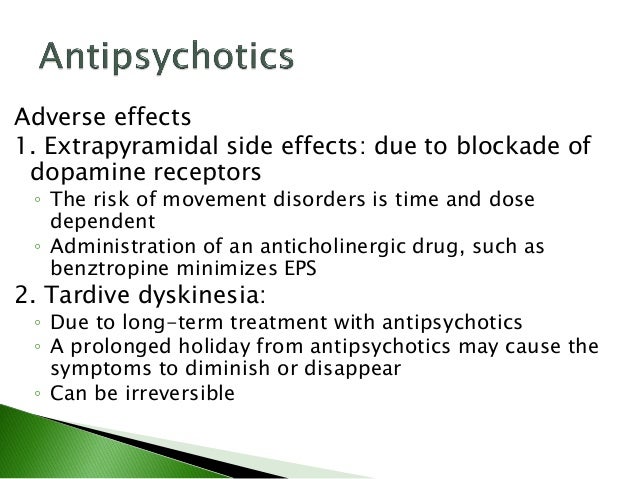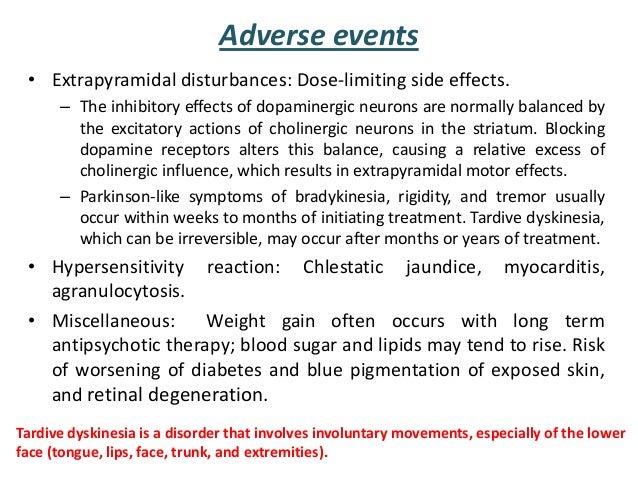The use of antipsychotics may result in many unwanted side effects such as involuntary movement disorders, gynecomastia, impotence, weight gain and metabolic syndrome. Antipsychotics may cause other side effects that are not included in this list above.

(PDF) Differences in Metabolic Sideeffects of Typical and
In cases where the individual has used the medication for a significant length of time, these extrapyramidal side effects may become permanent, even after the drug has been discontinued.

Long term side effects of antipsychotics. Questions linger regarding whether antipsychotics have a negative effect on the clinical course of. They suggest that psychiatrists consider the severe side effects and slowly reduce patients to the. A small percentage of individuals who take antipsychotics develop tardive dyskinesia, or uncontrollable movements.
Neuroleptic malignant syndrome (nms) neuromuscular side effects Anticholinergic side effects of antipsychotics include decreased salivation leading to dry mouth, decreased intestinal mobility leading to constipation, inhibition of visual accommodation leading to blurred vision, increased pupil size, and tachycardia251. Bradykinesia (significantly slowed movements) dystonia (involuntary muscle movements and contractions)
This page lists the most serious side effects that are possible with any antipsychotic drug. Antipsychotic medications cause four main extrapyramidal symptoms: The side effects of these medications include:
There are several side effects of antipsychotics, some more common than others. Some of these side effects are rare. For those who take antipsychotics, understanding how these substances interact, as well as the dangerous side effects of combining the two, is critical to safe and effective use.
This is a complex, unpleasant, emotional state that often (though not always) leads to visible restlessness. To report any serious adverse effects associated with the use of these medicines, please contact the fda medwatch program. Although antipsychotic medications are effective, some have substantial side effects, including several types of movement disorders, weight gain, and effects on sugar and lipid regulation.
Akathisia (restlessness, agitation & turmoil) akathisia may be one of the most serious side effects of antipsychotics. The first three usually begin within a few weeks of. For more information about the risks and side effects for antipsychotic medications, please visit drugs@fda.
This evidence was identi fied from recent Review questions long term use of antipsychotics. Changes to blood sugar levels or blood lipid levels;
The evidence cited for these concerns includes the association of antipsychotic treatment with brain volume reduction and with dopamine receptor sensitization, which might make patients vulnerable to relapse and illness. Although antipsychotic medications are effective, some have substantial side effects, including several types of movement disorders, weight gain, and effects on sugar and lipid regulation. Pseudoparkinsonism, akathisia, acute dystonia, and tardive dyskinesia.
These effects may lead to medical complications such as dental caries, ileus, and angina or myocardial. Rarely, antipsychotics may cause more serious side effects such as: The metabolic and cardiovascular side effects of long‐term antipsychotic treatment have been a source of concern as possible contributors to the increase of physical morbidity and premature mortality, especially in developed countries where most of the mortality in schizophrenia is related to consequences of metabolic disturbance and cardiovascular disease55, 56, 72.

10 seldommentioned “side effects” of using antipsychotics

FDAApproved Drugs to Treat Schizophrenia

Atypical Antipsychotic Side Effects Clinical Reference
Antipsychotic Drugs Adverse Effects

Side Effects Of Antipsychotic Medication Effect Choices

(PDF) Effects of LongTerm Multimodal Psychosocial
Possible DoseSide Effect Relationship of Antipsychotic Drugs
